Kavitha and Jyothi are domestic workers from Tamil Nadu who have been living in North Bengaluru for two decades, raised families here, and speak Kannada fluently. However, only Jyothi can access the free bus scheme. Kavitha doesn’t have an Aadhar card with a Karnataka address.
The Congress government’s free bus scheme, Shakti, is highly popular and has been lauded across the media. But the benefits of the scheme will not reach all women. Migrant women in the state who are not domiciled, will be left out of it.
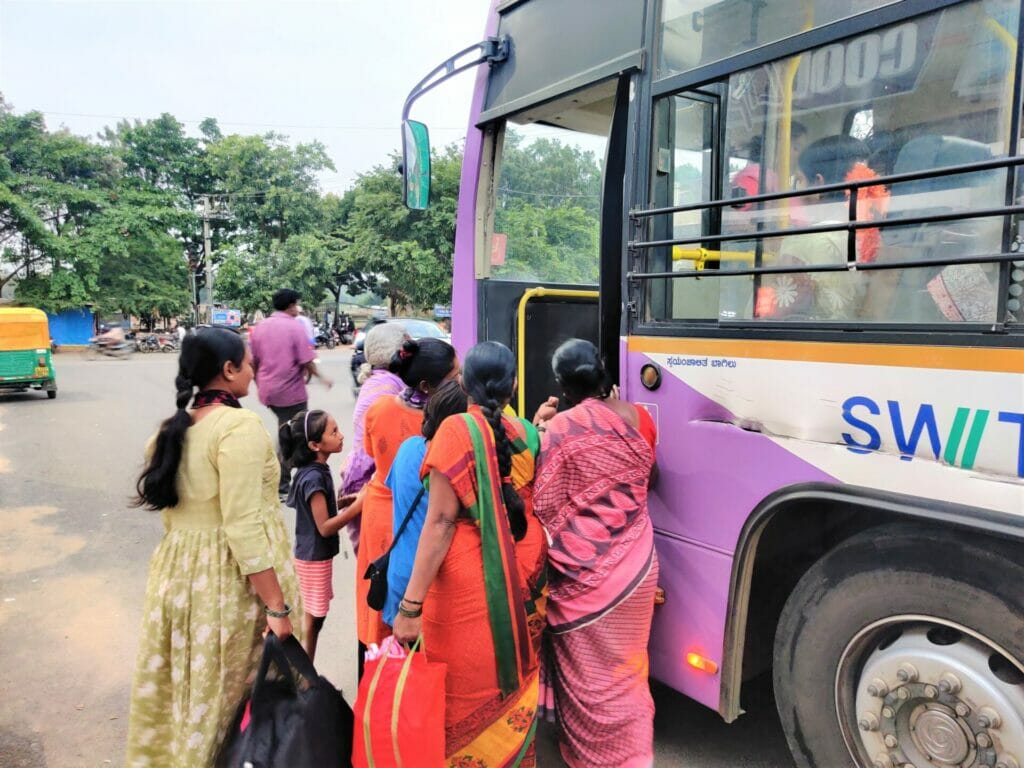
The government also plans to introduce smart cards for eligible women. The Road Transport Corporations (RTCs) have been instructed to provide the cards within the next three months, i.e., by September. Several rights groups, citizens, and even a Congress MLA have questioned this plan and the need to restrict access to the benefits in this way.
Conditions of the Shakti Scheme
Under the scheme, women of all ages who are domiciled in Karnataka can travel for free on ordinary government buses within the state. Premium, AC and luxury buses are excluded from the scheme. This means, women who have any government issued identity card with a Karnataka address can benefit from this plan. Women from other states who are in the city for formal or informal work or education are not eligible.
Unlike Karnataka, states like Delhi, which pioneered the free bus travel scheme under the AAP government, and Tamil Nadu do not discriminate between women availing bus services on the basis of residency. Both states have reported an increased ridership because of the scheme. A Tamil Nadu government report also stated that the scheme had allowed women to save between 8-28% of their income.
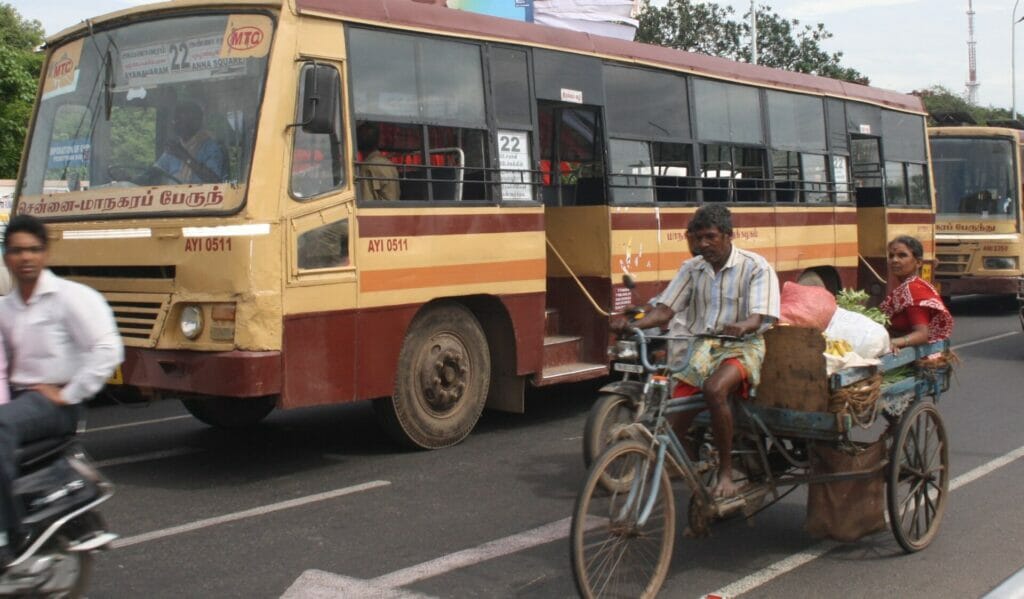
Why is domicile needed?
In a packed office room, off Cubbon Park, activists of the Sadhana Mahila Sangha, an organisation working for the rights of sex workers take time to speak to me after a long board meeting.
All the women gathered there are clear that the Shakti scheme is a great initiative, and their savings are substantial. “Even if we save around Rs 1,000 per month, it is a big amount for us,” says Usha*, a field worker with the organisation.
Vinutha, programme manager for the same organisation, says that the scheme has opened up the city and state for women. “My mother, who has hardly stepped out of her house, is thinking about travel and asking if she should get a smart card,” she says.
Sumana Narayanan, a Senior Researcher in the Road Safety and Sustainable Transportation team, at the Citizen consumer and civic Action Group (CAG), noted similar benefits. CAG is an independent non-profit organisation, based in Chennai.
“When we spoke to women two things emerged. One, they saved a substantial amount and this money was often cycled back into spending for the family. For example, women spent on school supplies or classes for their children or new shoes for them,” says Sumana.
“Secondly, women spoke of the freedom of movement. The ability to move without worrying about being a financial burden to their family, explore the city or access some recreation that they never could before.”
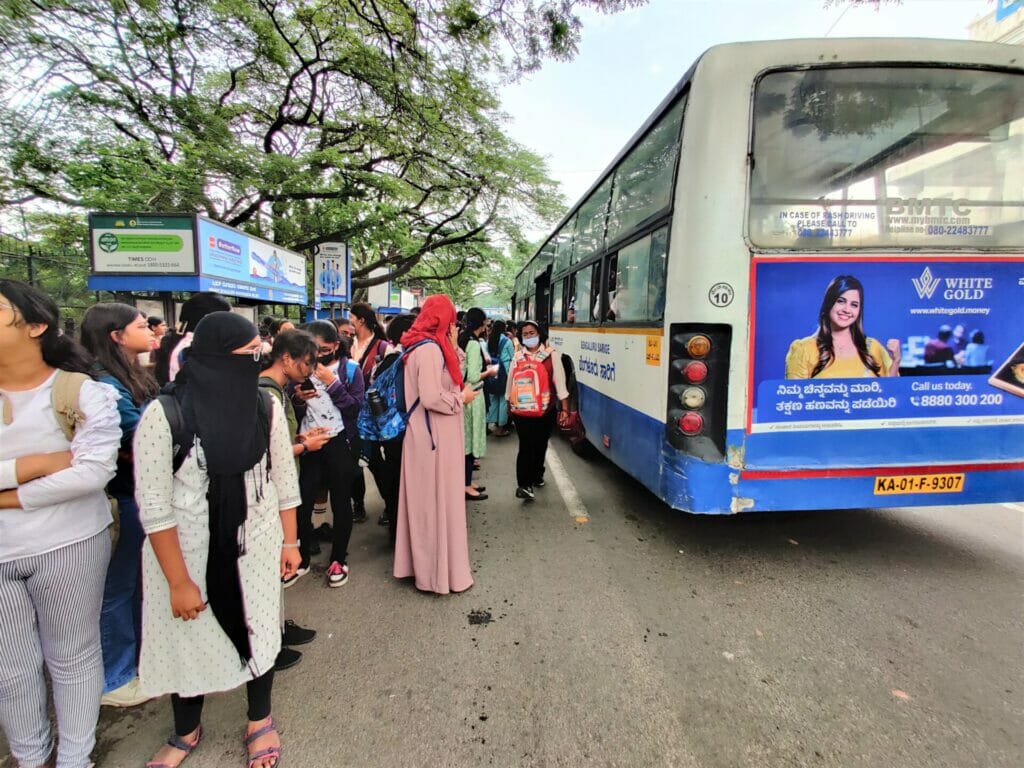
Read more: BMTC needs more support for a sustainable free bus scheme
Fallout of implementing the clause
Talk of the smart card however, evokes looks of disapproval on the faces of the women gathered at Sadhana Mahila Sangha. “If we go to Tamil Nadu, bus travel is free for us,” says Saritha*, another field worker at the Sangha. “Nobody asks us which state we are from. The conductors just issue us tickets. Why should it not be the same here?” Over and over this sentiment is echoed by women in the city.
Shilpa, a transwoman, who primarily relies on begging for her livelihood, points out the same thing. “I can go on a BMTC bus. There is no problem because I made my Aadhar card after coming to Bangalore. But so many of my friends, who are transwomen like me, have Aadhar cards made in Tamil Nadu. Until they change, they can’t go by bus. And they can’t save money like me,” she says.
Identity cards for migrants
The BMTC Managing Director, G. Sathyavathi, IAS, was not available to comment for this report. But in other media reports she justified the clause, saying that most migrant women would also have some form of government issued ID card. But there are two issues with this. First, there is no basis for the claim that migrant women will have some state ID card with a Karnataka address.
Kavitha, the tamil domestic worker, has lived nearly half her life in Bengaluru, but doesn’t want to change her Aadhar address to Karnataka for one reason. Even though she is poor and struggles to support her family with her income of Rs 10,000, in her native village back in Tiruvanamalai in Tamil Nadu, she has a tiny house that she helped her family build. “That is my permanent address. Here, I live in a shed. Whenever the owner tells me, I have to shift. Is it not better for my Aadhar card to have my permanent address?” she asks.
Read more: BMTC buses may be the only solution to solve Bengaluru’s mobility issues
Second, even if migrant workers have cards like the e-shram card issued by the labour department, bus conductors are not accepting anything but Aadhar cards on the buses.
Only Aadhar as ID
On a non-AC BMTC bus bound to Vidyaranyapura, the conductor refused to issue a free ticket when I showed my Karnataka issued driving license with a Bengaluru address.
The conductor had not seen the government order, which stated any government issued ID card could be used. “We have been told to only allow Aadhar Card or Voter ID with a Karnataka address,” he says. Several BMTC bus conductors reiterated this statement. Some even refused to accept digital Aadhar cards.
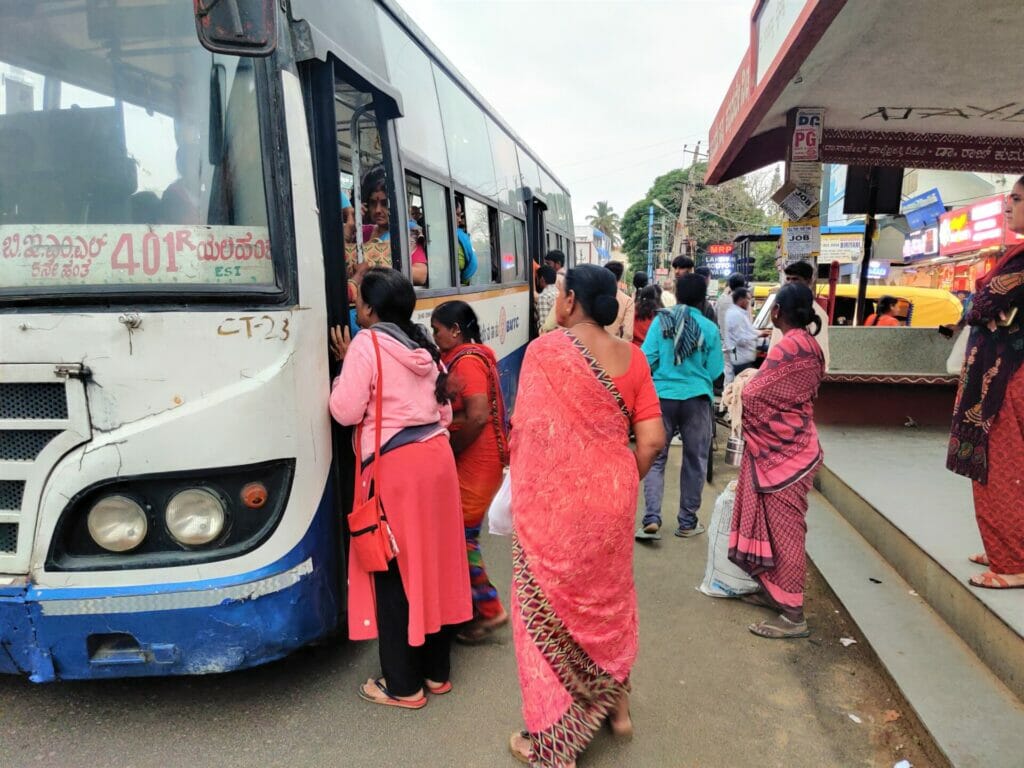
I met three women college students on the same bus. Two of them were issued free tickets with their Aadhar Card. The third student was denied a ticket, because she only had a college ID card with her Bengaluru address. She pleaded with the conductor in fluent Kannada, only to be refused. “I was born and brought up Bangalore. My house is here. But my Aadhar card has my native place in Tirupati, because my parents got it made there when there was some emergency,” she says.
Even for women with a Karnataka address, carrying an Aadhar card is not a simple thing. “My Aadhar card is the only ID card for many other schemes like government hospital, etc. I don’t like carrying it with me everyday when I am outside, because I might lose it,” says Jyothi, another domestic worker in North Bengaluru. “Then I will have to spend more time getting it back.”
Smart card, unwise move
Comparing the scheme in both states, Sumana, the researcher from CAG, points out that unconditional service in Tamil Nadu has greatly simplified the process. “I fail to understand the need for a domicile clause.”
The smart card adds another layer of complexity for women trying to access this benefit. As of now, the government order continues to say that smart cards can only be obtained through an online application.
“This forced digitisation of services is a major problem,” says Shaheen Shasa, of the Bengaluru Bus Prayanikara Vedike. “How many women can apply on the Seva Sindhu portal? Even if they can, that portal keeps crashing. How will domestic workers or women with limited literacy do this?”
“Even if Bangalore One starts issuing smart cards, we will have to spend a whole day or give money to middle-men to get the smart card,” adds Jyothi. Shaheen points out that smarts cards also burden poorly staffed transport corporations like BMTC.
“Ultimately, it is a question of how much difference will it make to the state, if all women access the bus,” says Sumana. “I don’t think it will make such a large difference to their expenditure. Especially, if you factor in the cost of smart cards,” she adds.
The BMTC public relations officer was unable to explain how much money would be saved by excluding migrant/non-domiciled women from this situation. She said that these questions would be answered after the applications for the smart card were launched.
Messaging around the scheme
Several women noted that conductors were behaving rudely with the women who were accessing free travel, especially if they didn’t carry their Aadhar. I personally witnessed this with several BMTC conductors, particularly on AC buses, mocking women enquiring if they could get a free ticket.
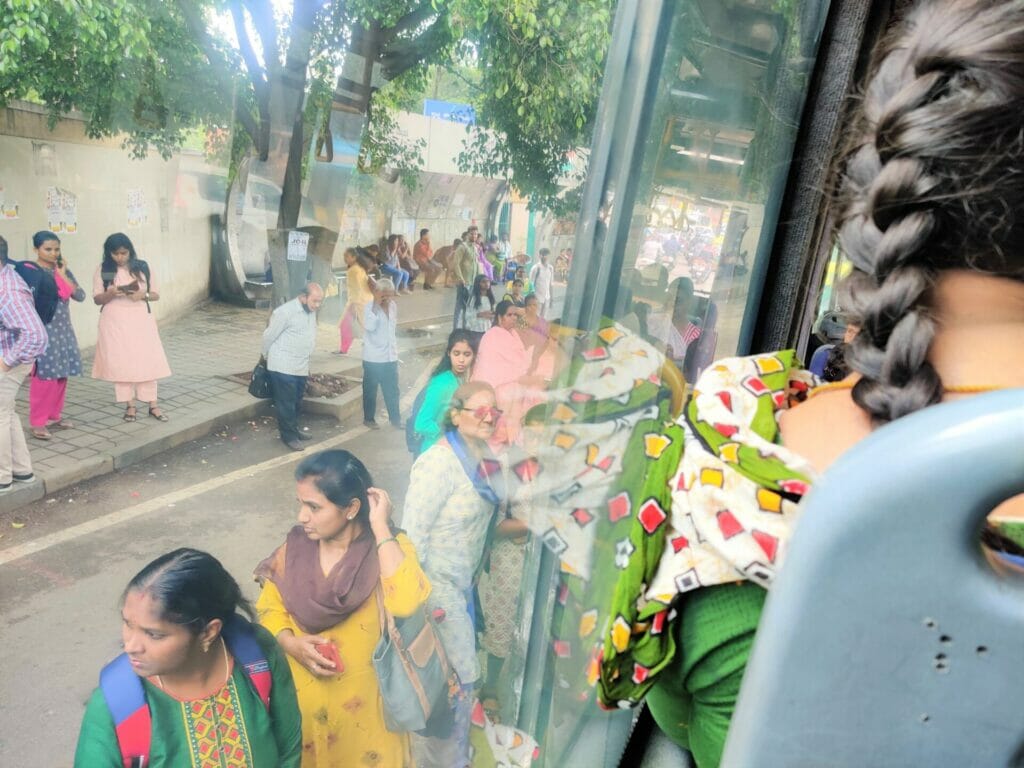
Sumana points out that messaging is vital in these cases. “Karnataka needs to carry out consistent messaging explaining why free travel is important for women. There should also be clear signage on buses that show which buses are free and which are not.”
Vinutha agrees. “All women, including migrants, also spend money in the state. They pay taxes on every small purchase. The state benefits from this. People need to understand that,” she says.
Shaheen adds that bus drivers and conductors be sensitised to the importance of the scheme. She also stresses that BMTC must hire more staff and increase its fleet so there isn’t pressure on the staff.
Saritha, field worker of Sadhana Mahila Sangha, summed up the predominant sentiment of the women I spoke to. “If the government is doing something good, they should not discriminate. All women should benefit, not just those of us from the state.”